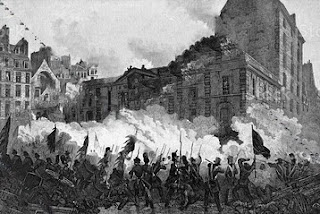How does Addison deal with the subject of satire in his essay or what are Addison's opinions about how satire is to be executed
 |
| Joseph Addison |
The focus of The Scope of Satire is more on the subject of satire than on anything else. Addison begins his essay by saying:
In his essay, Addison clearly brings out his opinion on how satire is supposed to be executed. But he also wants to make it clear that his satire would not pursue the "foolish beaten road" of personal satire followed by Dryden and Pope. Nor would his satire be of the other type suggests by a member of the club Sir Andrew Freeport, that regarding the "Vanity and Luxury of court ". Nevertheless, other members, for instance, Sir Roge has some reservations about the country squares as "they are the ornaments of the English Nation; men of good heads and sound bodies" and Captain Sentry expresses his aversion of satire about the arm forces of the country. Addison's anther "friend the templar" expresses his dislike to ridicule at "the follies of the stage and court". What comes out of this is a clear fact that the various representatives of different walks of life want their respective profession to be untouched. Then, this leads us to question what exact subject of satire should be.
However, the solution is made by another member, "the clergyman" who spikes in Addison's favour. He points out, in Addison's words "that vice and folly ought to be attacked" whatever their vocation is. Thus, by expressing the counter-opinion, he helps Addison to bring about his own idea about the use of satire and its compass. However, at last, every member of the club are acquiesced in "the clergyman['s]" opinion that Addison can attack a class in general for their "vice without hurting the person" and Addison also welcome it wholeheartedly.
Thus, clearly specifying the object of satire, Addison can take the liberty to ridicule or to mock the Punch, the famous puppet of his time, or the stage or city. court or country if they cross the limit of decency. I think he has a kind of intent where he will not hurt anyone but he can hurt everyone as a group or as a class.
From spotted skins the leopard does refrainThe leopard does not attack its own kind; i.e., everybody wants to favour his own class. Addison brings in the matter through a reported conversation with Will Honeycomb, one of his fellow members at The Spectator Club, on a paper published previously in which Addison writes on the opera and on the puppet show as a popular mode of entertainment made for women. This, according to Honeycomb, has made a section of the women readership irritated. Honeycomb also reported in Addison's words "that some of them were likewise very much surprised" at the choice of this subject. Thus, true to his title, Addison directly focuses on the subject matter at the very outside.
In his essay, Addison clearly brings out his opinion on how satire is supposed to be executed. But he also wants to make it clear that his satire would not pursue the "foolish beaten road" of personal satire followed by Dryden and Pope. Nor would his satire be of the other type suggests by a member of the club Sir Andrew Freeport, that regarding the "Vanity and Luxury of court ". Nevertheless, other members, for instance, Sir Roge has some reservations about the country squares as "they are the ornaments of the English Nation; men of good heads and sound bodies" and Captain Sentry expresses his aversion of satire about the arm forces of the country. Addison's anther "friend the templar" expresses his dislike to ridicule at "the follies of the stage and court". What comes out of this is a clear fact that the various representatives of different walks of life want their respective profession to be untouched. Then, this leads us to question what exact subject of satire should be.
However, the solution is made by another member, "the clergyman" who spikes in Addison's favour. He points out, in Addison's words "that vice and folly ought to be attacked" whatever their vocation is. Thus, by expressing the counter-opinion, he helps Addison to bring about his own idea about the use of satire and its compass. However, at last, every member of the club are acquiesced in "the clergyman['s]" opinion that Addison can attack a class in general for their "vice without hurting the person" and Addison also welcome it wholeheartedly.
Thus, clearly specifying the object of satire, Addison can take the liberty to ridicule or to mock the Punch, the famous puppet of his time, or the stage or city. court or country if they cross the limit of decency. I think he has a kind of intent where he will not hurt anyone but he can hurt everyone as a group or as a class.



